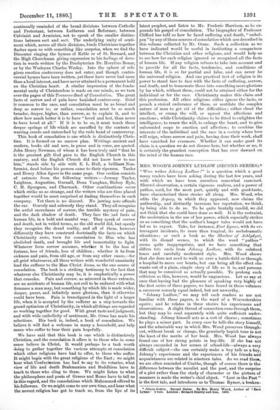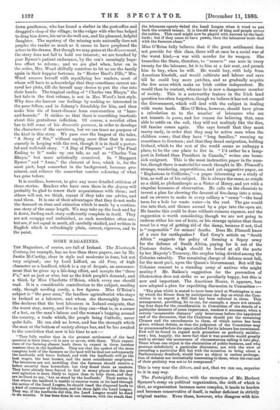MRS. WOOD'S JOHNNY LUDLOW (SECOND SERIES).* " Wuo writes Johnny
Ludlow ?" is a question which a good many readers have been asking during the last few years, and with which we have been ourselves somewhat exercised. Shrewd observation, a certain vigorous realism, and a power of pathos, used, for the most part, quietly and with good-taste, have characterised these stories all along. Mrs. Wood, who edits the Argosy, in which they appeared, now claims the authorship, and distinctly increases her reputation, we think, by being able to do so. To be quite brutally candid, we did not think that she could have done so well. It is the restraint, the moderation in the use of her power, which especially strikes us as something that the author's longer tales would not havo led us to expect. Take, for instance, East Lynne, with its ex- travagant incidents, its more than tragical, its melodramatic situations ; or such a book as the Shadow of Ash,lydyat, with its dismal scenes, to which the word " pathos " seems quite inappropriate, and we have something that differs toto caelo from Johnny Ludlow, with its subdued, tones and carefully moderated style. Mrs. Wood shows that she does not need to walk us over a battle-field or through, a hospital to move our hearts, but can bring all the effect she. wants out of a plain, simple story of life as it is, and persons. that may be conceived as actually possible. To prolong such criticism as this, however, would be ungracious. Let us say at once that having had the pleasure of speaking very highly of• the first series of these papers, we have found in these volumes a successor scarcely equal indeed, but not unworthy.
"Johnny Ludlow," we may tell such readers as are not familiar with these papers, is the ward of a Worcestershire squire ; and he relates in these stories his experiences and observations. A slight thread of connection runs through tbem, but they may be read separately with quite sufficient under- standing. Johnny himself acts as a sort of chorus ; sometimes he plays a minor part. In every case he tells the story himself,. and the admirable way in which Mrs. Wood preserves through. out, without break or change, the genuinely boyish tone is not the least of the merits of her book. Mrs. Wood has always found one of her strong points in boy-life. If she has not always succeeded in her scenes of school-life—always a very difficult subject—she can certainly make a boy talk as a boy. Johnny's experiences and the experiences of his friends and acquaintances are related in nineteen tales. As we read them, we are often reminded of Crabbe, though of course there is the difference between the novelist and the poet, and the surprise of a plot rather than the study of character or the picture of manners is made the writer's chief object. "Lost in the Post" • is the first tale, and introduces us to Thomas Rymer, a broken-.
• Johnny Ludlow. Second Series. By Mrs. Henry Wood, Author of "But Lynne." 3 vols. London : Richard Bentley and Son, 1880. down gentleman, who has found a shelter in the post-office and druggist's shop of the village; to the vulgar wife who has helped to drag him down, his ne'er-do-well son, and his pleasant, helpful daughter. The mystery of the missing note naturally does not perplex the reader so much as it seems to have perplexed the actors in the drama. But though we may guess at the (162.0mm:tit, the story does not fail to hold our interest; we are touched by poor Rymer's patient endurance, by the son's seemingly hope- less effort to reform ; and we are glad when, later on in the series, Mrs. Wood skilfully contrives to let us see the family again in their happier fortunes. In "Hester Reed's Pills," Mrs. Wood amuses herself with mystifying her readers, most of whom will have to acknowledge that they sometimes cannot un- ravel her plots, till she herself may choose to put the clue into their hands. The tragical ending of "Charles van Rheyn," the last tale in the first volume, is not in Mrs. Wood's best style. Why does she harrow our feelings by making us interested in the poor fellow, and in Johnny's friendship for him, and then make him die of heart-disease from over-exertion at "hare- and-hounds." It strikes us that there is something inartistic about this gratuitous infliction. Of course, a novelist often has to kill some of his dramatis personce, in order to develope the characters of the survivors, but we can trace no purpose of the kind in this story. We pass over the longest of the tales, 4' A Story of Sin," without saying more than that it seems scarcely in keeping with the rest, though it is in itself a power- ful and well-told story. "A Day of Pleasure" and "The Final Ending to It" make up one tale, as sad HS "Charles Van Rheyn," but more artistically conceived. In "Margaret Rymer" and "Anne," the element of love, which is, for the most part, kept somewhat in the background, becomes pro- minent, and relieves the somewhat sombre colouring of what has gone before.
It is needless, however, to give any more detailed criticism of these stories. Readers who have seen them in the Argosy will probably be glad to renew their acquaintance with them; and others will not, we think, repent if they take our advice, and read them. It is one of their advantages that they do not make the demand on time and attention which is made by a continu- ous story of the same length. We may take up the book and lay it down, finding each story sufficiently complete in itself. They are not scrappy and unfinished, as such novelettes often are; but are, if not equal in merit, all carefully studied, and written in English which is refreshingly plain, correct, vigorous, and to the point.







































 Previous page
Previous page